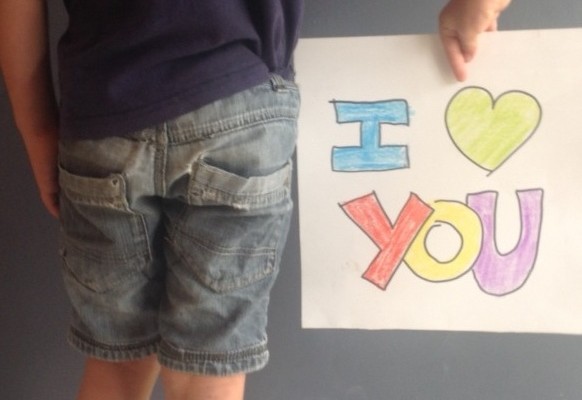
The all-important voice of parents: What you say to your kids becomes their inner voice (pt 2)
‘The voice of parents is as the voice of gods.’ So says Shakespeare.
I didn’t take him for much of a parenting expert, but on this aspect of raising kids, I have to agree with the old guy. Our words carry a kind of divine weight during our children’s early years… impressing something that will stay long after the wet cement of their hearts and minds and souls may have dried.
You see, our words are not raindrops, evaporating moments after we say them. As I said in the previous post, they are more like seeds. Slowly, slowly, they take root. Some lie dormant in our child’s subconscious, suddenly taking root and growing years after we planted them, and long after we even remember saying them.
Our words have immense potential to shape the people our offspring are becoming, for better or for worse. In particular, our words tend to affect the way our child sees and feels about three things…
1. Our words affect how they feel about themselves.
Words can build us up or break us down. Pity the child who is seeded with: ‘You’re not good enough.’ ‘Why are you always so…’ ‘If only you could be more like your brother.’ ‘I feel sorry for whoever marries you.’ ‘I’m not impressed with you.’ ‘You don’t know what you’re doing.’ ‘Shut up.’ ‘Shame on you.’ ‘Your singing irritates me.’ ‘I wish you were a son.’ ‘You always get it wrong.’ ‘You disappoint me.’ ‘You always make me angry.’ ‘I love you but…. ’
A friend told me about his experience of a train-line in an economically booming South-East Asian city. A spike in suicides had led authorities to speak soothing words over the loudspeaker to waiting passengers as a train approaches: ‘Your life is valuable. You have a purpose.’ In that culture the youngest are often taught that one’s value is determined by their achievements. Parents say, ‘I will love you if…’ There, you earn the air you breathe by the work you produce. That’s why under-performers are ready to throw themselves before moving metal – unless, of course, an outer voice can temporarily stall the inner voice that took root in their earliest years.
Let’s take this bag of words, and sow them for good. Let’s plant seeds that will help our kids to value themselves – especially when life throws curve-balls ahead.
One of my sweetest times with my little girl is putting her to sleep. It doesn’t always pan out like this, but sometimes I stroke her hair, and a few times over I whisper, ‘You’re loved. You’re safe.’ Then she dozes off, wrapped in a word-blanket of love and security. Hopefully this will insulate her from the potentially identity-crushing criticisms and painful life experiences that tend to come into all of our lives eventually.
2. Our words affect how they feel about us.
It’s not Rocket Science to say that if we constantly say negative words to our kids, they will feel negatively about us. More positively charged words elicit more positive feelings towards us.
Of course there’s a lot of correction and guidance parents have to bring, but put yourself in their shoes. If 85% of the feedback we receive from our boss and spouse today is negative, we’d be discouraged. Either we’d lose our confidence, or we’d build up a self-protective resistance that makes you immune to their future feedback.
Kathryn Kvols in her book ‘Redirecting Children’s Behavior’ points to research that reveals how on any given day the average parent is 13 times more likely to guide or correct their child in a negative rather than a positive way.
Think about that! What’s the difference between a marriage that’s thriving and one that’s on the rocks? In the former, there’s 5 positive interactions to 1 negative one – 5 to 1. In the latter, it’s 1 to 1. Well. imagine the strain on the parent-child bond when it’s 1 to 13!
I am not saying we don’t say ‘No’ and ‘Don’t do that’ but that we try shift the percentages toward the positive. What if, for the next 24 hours, you evaluate the overall charge and tone of your words.
Here’s some ideas to add a positive spark: 1) Don’t yell. 2) State commands positively. For example, instead of saying, ‘Stop touching your brother’s Lego!’ say, ‘You play with your Lego, let him play with his’. Or say, ‘Speak softer, I can hear you’ rather than, ‘Stop shouting at me!’ 3) Speak encouraging words. ‘Thanks for the help.’ ‘Look at you – you didn’t cry this time.’ ‘All your hard work is paying off.’ ‘I love spending time with you.’ ‘Very interesting thought.’ 4) It’s not just what you say, but the tone with which you say it, so speak warmly and gently, not rudely and irritably.
3. Our words affect what they value and how they treat others.
Not just what we say, but what we don’t say, or don’t say enough of, can undermine our children’s character formation. Richard Weissbourd, a Harvard psychologist, surveyed 1000s of youth and revealed that a full 80% of them said their parents were more concerned with their achievement or happiness than whether they cared for others. In fact, the interviewees were three times more likely to agree that ‘My parents are prouder if I get good grades in my classes than if I’m a caring community member in class and school.’
When I read these results I asked myself, ‘Whatever gave the kids these impressions about their parents’? The answer is surely the words the parents spoke, and how often they were uttered. Think about that – parents creating a dog-eat-dog culture in the next generation through their thoughtless barks (I mean words).
Contrast that with the ancient Jewish community who strategically transferred character-forming wisdom from generation to generation, by teaching their kids the 100s of axioms in their book of Proverbs. What they knew that we don’t is that children need time-tested capsules of truth, driven like a stake into their minds, until each truth becomes a star in the constellation of wisdom they can use to navigate their daily life by.
With this ancient practice in mind, I propose that every child needs to be encoded again and again with carefully crafted phrases that will set them up to soar in a moral universe. Proverbs has many, but you can create your own: ‘Sharing is caring.’ ‘Boys never hit girls.’ ‘If it’s not fun for all, it’s not fun at all.’ ‘It’s not the end of the world!’ ‘Be kind.’ ‘Wait your turn.’ ‘If at first you don’t succeed, try again.’ ‘It’s okay to fail.’ ‘It’s okay to feel sad/depressed/disappointed/frustrated.’ ‘It’s always best to tell the truth.’ ‘Forgive her.’ ‘You’re not the centre of the universe.’ ‘Do the right thing – even if you could have gotten away with it.’ You get the idea.
There’s tremendous power in repeating carefully chosen axioms, each time weaving it more deeply into their malleable neural circuitry. What they value twenty years from now is at stake. So choose your words carefully. They will shape their inner voice.
But how do I determine what my child needs to hear? In my next post, I’ll share with you five critical questions we should ask ourselves about each of our children to help us plant the right kind of seeds.
Comments
Also published on Medium.




